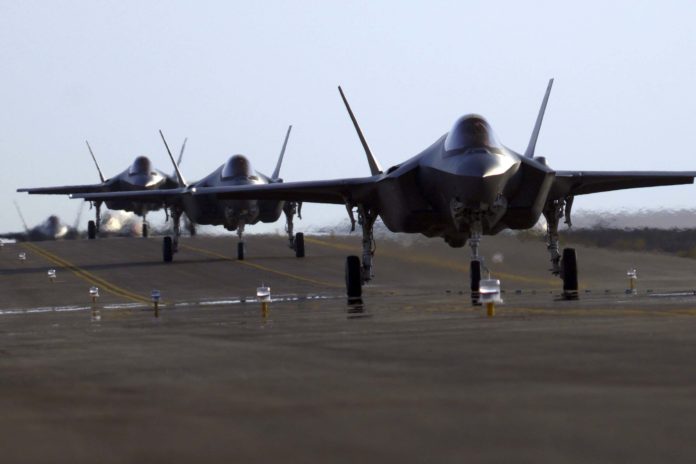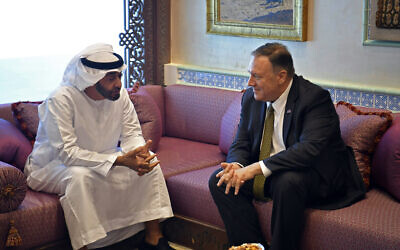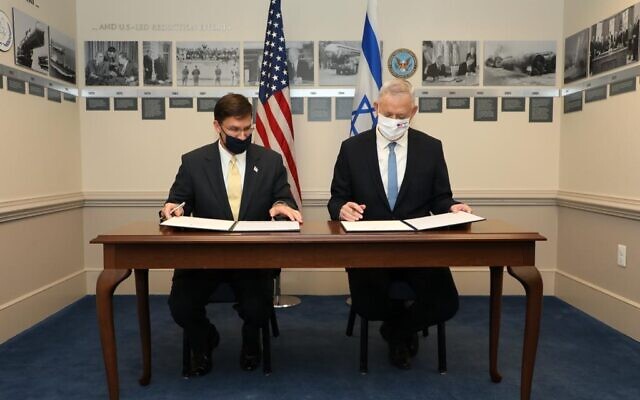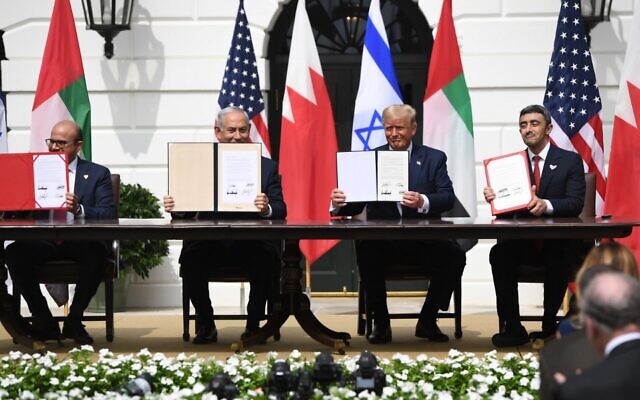

State Department formally notifies Congress of intention to sell 50 stealth fighters and other advanced military gear to Abu Dhabi, says it won’t affect Israel’s military edge.
The Trump administration formally notified Congress on Tuesday that it intends to sell 50 stealth F-35 fighter jets to the United Arab Emirates as part of a broader arms deal worth over $23 billion, aimed at deterring potential threats from Iran, despite concern in Israel.
US Secretary of State Mike Pompeo said he had authorized the sale in keeping with the administration’s Middle East peace efforts, and directly tied the arms sale to the UAE’s decision to normalize ties with Israel.
“This is in recognition of our deepening relationship and the UAE’s need for advanced defense capabilities to deter and defend itself against heightened threats from Iran,” Pompeo said in a statement.
The notification to lawmakers follows September’s signing of the Abraham Accords between Israel, Bahrain and the UAE, under which the Arab states agreed to normalize relations with Israel.
Israeli officials had previously expressed some concern about an F-35 sale because it could affect the balance of military power in the region. But Pompeo said it would be “fully consistent” with the longstanding policy of maintaining Israel’s qualitative military advantage.
The sale, worth up to $23.37 billion, includes 50 F-35s, 18 advanced armed Reaper drone systems and a package of air-to-air and air-to-ground munitions.


Mohamed bin Zayed al-Nahyan in Abu Dhabi, United Arab Emirates,
September 19, 2019. (Mandel Ngan/Pool via AP)
“The UAE’s historic agreement to normalize relations with Israel under the Abraham Accords offers a once-in-a-generation opportunity to positively transform the region’s strategic landscape,” Pompeo said. “Our adversaries, especially those in Iran, know this and will stop at nothing to disrupt this shared success.”
After agreeing to normalize relations with Israel in August, Emirati officials had said purchasing the F-35s was among their main goals. At the time, Prime Minister Benjamin Netanyahu insisted that he had not agreed to the sale as part of the treaty with the UAE, but he and Defense Minister Benny Gantz later dropped public objections to it.
Some in the US have also raised concerns over arms sales to the UAE, due to its involvement in the Saudi-led bombing campaign in Yemen.
Israel’s Channel 13 news on Tuesday night said Saudi Arabia and Qatar were also interested in similar arms deals with the United States, and speculated that such deals might move ahead as part of a warming of ties between those two countries and Israel. President Donald Trump has repeatedly predicted that Saudi Arabia and up to nine other countries are readying to normalize relations with Israel, following the UAE, Bahrain and most recently Sudan.
Pompeo in his statement compared the sale to assistance the US gave Egypt and Jordan after they agreed to make peace with Israel, seemingly undermining Netanyahu, who has insisted vociferously that the arms sale was not linked to the normalization agreement.
“Today’s announcement echoes the enhanced defense cooperation we embarked upon with Egypt in the wake of the 1979 Camp David Accords, as well as our closer security relationship with Jordan following its normalization of ties with Israel in 1994,” Pompeo said. “Together, we are committed to securing the success of the Abraham Accords.”
Reports of the US intention to sell F-35s to Abu Dhabi began to surface in August, days after the UAE agreed to normalize ties with Israel following negotiations brokered by the White House. It came as a shock in Israel, particularly to the country’s security establishment, which Netanyahu had excluded from the negotiations with Abu Dhabi.
Until then, the US had rejected requests from countries in the Middle East to purchase the F-35 primarily out of concerns that such sales would damage Israel’s qualitative military edge, or QME, which the United States is legally required to ensure remains intact despite any American arms sales in the region.
The prime minister has repeatedly denied that he gave approval for the sale of the F-35, as well as advanced unmanned aerial vehicles and other weapons, as part of the UAE deal, or that there were secret negotiations to that effect.
This has been publicly questioned by Gantz and outright disputed by opposition party members.
In light of the proposed weapons sales to the UAE, Gantz traveled to Washington twice and then-US Secretary of Defense Mark Esper came to Israel once in the span of just over a month in order to lay out the general framework for a way in which the US would ensure Israel’s military advantage.


Trump officials have acknowledged that the deal with Israel placed the UAE in a better position to purchase the advanced aircraft, which only Israel currently has in the Middle East.
Netanyahu initially voiced opposition to the sale, but last month reversed his position, issuing a statement saying Israel would not oppose US plans to provide “certain weapon systems” to the UAE.
Days later the White House informally notified Congress of the proposed sale.
(Times of Israel).






